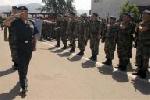 Goggle, Reuters
Goggle, Reuters - BEIRUT (Reuters) - Lebanon's parliament is set to vote in army chief General Michel Suleiman as the country's 11th president on Sunday, filling a post left vacant for six months by a crisis that threatened a new civil war.
A Qatari-brokered deal between rival Lebanese leaders last week defused 18 months of political stalemate that erupted into street fighting this month. Iranian-backed Hezbollah fighters briefly seized parts of Beirut, routing government loyalists.
Members of parliament from the U.S.-supported ruling majority and the Hezbollah-led opposition will attend a parliamentary session at 1400 GMT (10 a.m. EDT) to elect Suleiman as president, as stipulated by the Doha agreement. The vote had been postponed 19 times because of the crisis.
The deal achieved most of the opposition's demands and secured the election of a president who has good ties with Syria and Hezbollah. The agreement was widely seen as a setback to Washington and its allies, who had pressed for the disarming of Hezbollah and the isolation of Damascus.
"God willing, with the election of the president, Lebanon will move into a stage of stability and calm ...," Arab League chief Amr Moussa said on arrival in Beirut to attend the vote.
The deal also calls for the formation of a national unity government where the opposition has veto power and a new law for the 2009 general election.
The agreement aims to defuse a conflict that has stoked sectarian tensions, paralyzed government and the country's constitutional institutions, and battered the economy.
Parliament has not met for more than a year and a half, during which time the government of Prime Minister Fouad Siniora has barely functioned. Bouts of violence claimed scores of lives and revived memories of the 1975-90 civil war.
Sunday's vote will be attended by Qatar's emir and his prime minister -- the driving force behind the Doha agreement -- and a host of foreign ministers, including those of arch-rivals Syria and Saudi Arabia as well as of France, Turkey, Egypt and Iran.
Saudi Arabia, France and Egypt back the government while Iran and Syria support the opposition. No U.S. administration official is expected at the session though a delegation from Congress arrived to attend the vote.
Lebanese troops tightened security in the capital, blocking off streets leading to parliament in downtown Beirut.
SYRIAN ERA
Lebanon's complex power-sharing system stipulates that the country's president should always be a Maronite Christian, the prime minister a Sunni Muslim and the speaker of parliament a Shi'ite.
Suleiman, who relinquishes his post as army commander, fills a chair vacated in November by Emile Lahoud, an ally of Syria. Appointed army chief in 1998 when Damascus controlled Lebanon, Suleiman is inescapably linked to the Syrian-dominated era.
He coordinated closely with Syrian troops before they were forced to withdraw from Lebanon in 2005 by Lebanese and international pressure triggered by the assassination of former Prime Minister Rafik al-Hariri.
As president, Suleiman will have to grapple with a slew of divisive issues including ties with Syria and a U.N. Security Council resolution that calls for all militias to be disarmed -- a demand supported by Hezbollah's Lebanese opponents.
But his first task is to appoint a new prime minister and coordinate with him the formation of the new cabinet. The leader of the parliamentary majority, Saad al-Hariri, is the frontrunner for the job but he could still opt to nominate incumbent Siniora, an ally, officials said
The president has to name the candidate nominated by a majority of MPs.
Suleiman will be sworn into office shortly after his confirmation and will deliver a speech to parliament, setting the tone for his six-year term.
Fluent in English and French, Suleiman is married with three children. He graduated from the Military Academy in 1970 and holds a Lebanese University degree in politics and administration. He was born in the Christian village of Amchit.

